Paul:
I first heard about the bombings in London the way a lot of people did, on television. About quarter past nine on Thursday morning, Sky News ran a `Breaking News’ scroll along the bottom of its regular newscast, saying an explosion had occurred at Liverpool Street station. Liverpool Street is a transport center, combining an overland train station, a Tube stop, and a bus terminal. If you’ve seen Mission Impossible , you’ve seen a bit of it -- Tom Cruise and his crew of disavowed agents stay in a room above the Tube stop, and at one point, Cruise crosses the street and makes a call from a pay phone in the train station, then looks up to find himself face to face with Jon Voight, whom he’d thought dead.
Liverpool Street is also three blocks from my office. As you know, I work for a large international news organization, which shall remain nameless to avoid contaminating my employers with any opinion I might express, and also to keep them from firing my ass. Let's just say, the bulletin got everyone's attention.
Then Sky News ran another scroll that said the explosion was caused by an ``electrical surge,'' and people relaxed. Until another scroll said a second explosion had been reported at the Edgware Road Tube stop. Yet another scroll said both explosions were caused by that electrical surge. By then Sky News had a helicopter over Liverpool Street providing a live feed. It showed rescue workers around the entrance to the station and people sitting and lying on the ground.
I asked no one in particular, how does an electrical surge cause an explosion? Nobody had a clue. We're reporters, we tell people what's happening in the world, but we don't actually know much about how the world works, at least mechanically. Somebody theorized a surge of power in the lines could cause, you know, relay stations or something to pop. I looked up at the Sky News screen and said, would that be enough to leave bodies lying on the ground? Nobody knew the answer to that one, either.
The first official word came at 9:37 in an e-mail bulletin from Scotland Yard, which read in full:
At approx 0850 on 7.7.05 we were called to Aldgate LT stn to assist the City
of London police and BTP regarding an incident on the underground system.
All of the emergency services are on scene.
There have been some casualties.
This has been declared as a major incident.
Too early to state what has happened at this stage.
(Like all quasi-military organizations, the Metropolitan Police Service, which is the London region's police force, based at New Scotland Yard, has an unnatural affection for abbreviations, initials, acronyms, and miscellaneous abuses of written and spoken English. They also can't spell for crap. In the bulletins I'm including, I've preserved all the idiosyncratic nomenclature, spelling, grammar, and typography, providing translation where necessary.)
Aldgate East is the next stop east of Liverpool Street. People from the train had come out of the tunnel at both stations, leading to some confusion about what had happened and where. ``LT'' is London Tube, presumably; there's no official agency with those initials. The line between there and Liverpool Street lies within the City of London, the anachronistically self-governing district that's the equivalent of the Wall Street area in New York. Presumably, that's why the City of London police force, a different body from the Metropolitan Police, were the first involved, along with the British Transport Police, or BTP.
By then, Sky News -- along with the BBC and CNN, but I was facing the Sky News monitor and relying on it -- was announcing more events, including either a bus crash or an explosion on a bus. All the television networks had abandoned the electrical-surge theory, and later no one seemed to know where it had come from. At 10:22 a.m., Scotland Yard sent another bulletin.
At approx 08:50 on 7.7.05 we were called to Aldgate LT stn to assist the
City of London police and BTP regarding an incident on the underground
system.
All of the emergency services are on scene.
This has been declared as a major incident.
Too early to state what has happened at this stage.
There have been further reports from multiple locations in London of
explosions. It is too early to say what has caused these explosions.
Police are responding to reports from:
Edgware Rd
Kings x
Liverpool St
Russell Sq
Algate East
Moorgate underground stations.
Furthermore there has been a confirmed explosion on a bus in Tavistock
Place.
The MPS, BTP, City of London Police are working together to ensure officers
are deployed to each scene.
There have been reports of numerous casualties but it is too early to say
numbers at this stage.
NOT FOR PUBLICATION: As soon as the situation is clarified further
information will issued
``K ings x'' was the no-doubt harried information officer's way of saying King's Crossing, another combined Tube and train station. ``Algate East'' should be Aldgate East. Moorgate is the next stop west of Liverpool Street. In fact, what were reported here as explosions at the Aldgate East, Liverpool Street, and Moorgate stations turned out to be the same, single explosion. At 11:44 a.m., another bulletin followed, this one from the commissioner of the Metropolitan Police, Sir Ian Blair. The commissioner is not, incidentally, related to Prime Minister Tony Blair.
Comments by Commissioner:
There have been at least six explosions in London this morning.
We are advising members of the public not to travel into London. Public
transport in London will be affected in the next few days.
We are also asking members of the public not to contact police at this stage
unless it is a genuine emergency.
We are co-ordinating the other emergency services in responding to this
major incident.
We will be issuing a telephone number shortly for worried relatives.
It is too early to confirm the numbers of casualties at this stage.
We hope to have the situation under control very soon.
That was a rather forlorn hope on the part of the commissioner. He was also wrong about the number of explosions, so evidently Scotland Yard was still confused by the reports from Aldgate East, Liverpool Street, and Moorgate. That got sorted out in the next bulletin, at 12:25 p.m.
Update Re Explosions - Latest from New Scotland YardThere are now four confirmed
sites where police are dealing with reported explosions. These are:
1) Russell Square and Kings Cross underground
2) Moorgate, Algate, and Liverpool Street underground
3) Edgware Road underground
4) Tavistock Square where there has been a confirmed explosion on a bus.
The emergency services are working together in a co-ordinated response and
liasing with hospitals to rescue those injured.
The London Underground system has been suspended however the Network Rail system
is still in operation. We would urge anyone who doesn't need to come into London
today not to do so. If you are already in London wherever possible please limit
travelling around the capital.
The Met continues to respond to 999 emergency calls but non emergency calls will
have a seriously delayed response.
We cannot at this stage confirm the number of those injured, though casualties
are multiple. There are believed fatalities but numbers again are not confirmed.
All published information will be available on www.met.police.uk .
The next couple of bulletins provided nothing but information for reporters, about a press center opening and some interview opportunities. The first with real information came at 2:10 p.m., although the added information was scant -- confirmation that people had been killed. By then, nobody doubted that.
UPDATE re Explosions - Latest from New Scotland YardUPDATE:
We are issuing the following advice to the public:
Stay where you are for the time being
Tune into TV, radio and relevant websites
Don't come into London or cross it
Emergency services have responded robustly and are coping. Contingency planning
is in place and an emergency plan has been implemented - all services are
responding.
We can confirm that there have been a number of explosions, but it is too early
to speculate what might be behind these explosions - and this would not be
useful.
A number of casualties have been taken to hospitals across London. We can
confirm that there have been some fatalities; there are no figures available a
this early stage. We will not speculate on numbers at present.
Casualty bureau will be opening shortly, as will an emergency line for public
information and advice.
The first solid information on how bad the attack had been came at 3:48 p.m.
Major incident update including casualty figures - Latest from Scotland
Yard08.51 - Liverpool Street Station - confirmed explosion in a carriage 100 yd
into the (Liverpool St-bound station) tunnel. Walking wounded emerging from the
line at Kings Cross. Believed train involved is Central or Circle. Seven
confirmed fatalities, 10 seriously injured, 100 walking wounded.
8.56 - Kings Cross / Russell Sq incident - Both stations are being used to
extract casualties. All injured have now been dealt with and at 12.30 LAS has
withdrew from Russell Sq.
Two mortuaries are being set up at the Royal National Hotel and the Holiday Inn
in Bloomsbury.
21 confirmed fatalities and others injured.
09.17 Explosion on train coming into Edgware Road underground station approx.
100 yards in the tunnel. There was an explosion on a train which blew through a
wall onto another train on an adjoining platform.
There five fatalities and others injured.
Three trains believed involved.
09.47 Explosion on a bus at Upper Woburn Square junction with Tavistock Place.
There are fatalities still on the bus - not known how many. We estimate many
casualties.
There were four devices in total.
There was no warning to police and we have not received any claims of
responsibility.
It was a callous attack on purely innocent members of the public deliberately
designed to kill and inflict maximum injury.
11.52 All London hospitals full.
This is confused and inaccurate in a few places. The first item, at 08.51, implies walking wounded from the Liverpool Street explosion came out of the tunnel into the King's Cross station. That would have been quite a hike -- there are three stops between Liverpool Street and King's Cross on the Circle Line, on which the bombed train was traveling.
Presumably, the information officer was thrown off by reports of the next incident, at 8.56. That occurred on a train on the Picadilly Line traveling between the King's Cross and Russell Square stations.
The times of the incidents given here turned out later to be mostly wrong. The police say now all three Tube explosions occurred at 8:50 a.m., within 50 seconds of each other.
The bus bombing took place at the junction of Upper Woburn Place and Tavistock Square, not Upper Woburn Square and Tavistock Place. A Tavistock Place does exist, but Upper Woburn Square does not, although just plain Woburn Square does. Tavistock Street also exists, and different media throughout the day reported the bus bombing took place on all the Tavistocks. Some also said it took place at Russell Square. Upper Woburn Place becomes Tavistock Square, then becomes Upper Woburn Place again, then runs into Russell Square from the north, and they all intersect the other Tavistocks at various places, so the confusion was understandable, if you live in London. If you don't, you'll never understand it and shouldn't try. The exact time of the bus explosion, for some reason, has taken a while to work out. For now, on Sunday morning, the police are sticking with 9:47 a.m.
And while this says ``LAS,'' presumably meaning London Ambulance Service, ``has withdrew'' from Russell Square, I seriously doubt that. By then, I'd been pretty close to Russell Square for several hours, and I saw ambulances all over the place.
I was there because by chance I'd just spent a long weekend in Prague, and because I'm a little lazy. When I travel, I carry my digital SLR camera and several lenses in a backpack. When I'm in London and working, I use the same backpack to hold magazines and my iPod and sunglasses and a baseball cap in case it rains and all the other odds and ends everybody carries around. I hadn't bothered to take the camera and lenses out of the backpack when I came back to work Wednesday, and I still hadn't taken them out by Thursday morning, so I had them in the office with me.
And because I wanted to see what was going on, I went to our photo editor and volunteered my services as a photographer. His face lit up, because most of the freelance photographers he depends on weren't in London. They were up in Gleneagles, Scotland, for the Group of Eight summit meeting, which ironically enough was the event that a lot of people are speculating led the terrorists to schedule Thursday for the bombing.
I also told him that I lived about ten blocks from the scene of the bus bombing. Since the rest of the bombs had been underground, that was the one we were most likely to get pictures of, and I could file from my flat any images I got. Sounds like a plan, he said.
A few organizational details needed to be worked out.
I'm a desk-bound editor and low-grade manager, not a staff photographer or even a reporter.
Getting clearance took some time -- too much time, as it happened. When I eventually got to the Russell Square area, more than two hours after the first report of an explos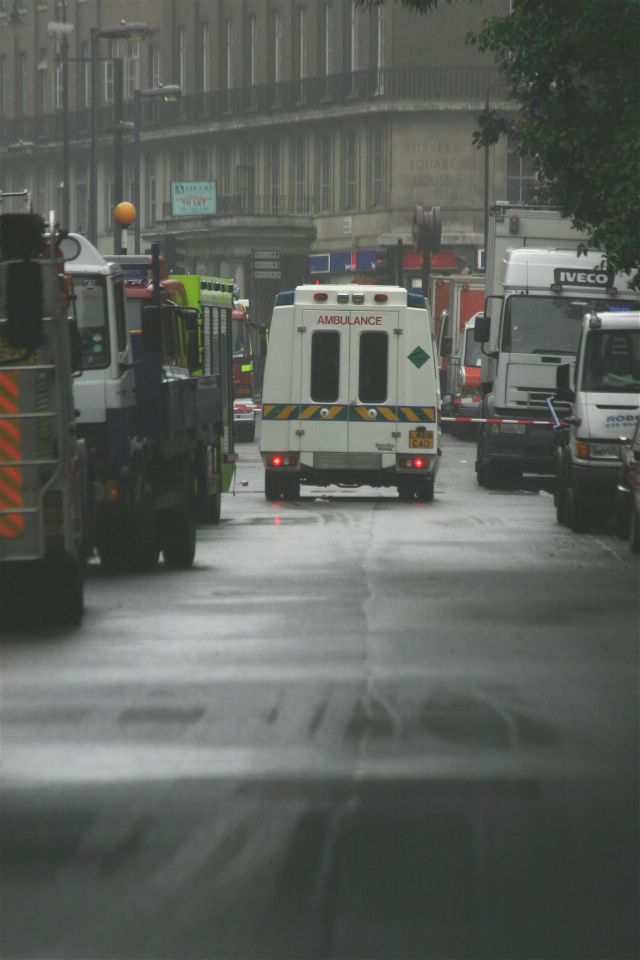 ion, the police had got organized and thrown a cordon around the bomb site, and they weren't letting
ion, the police had got organized and thrown a cordon around the bomb site, and they weren't letting anybody through that cordon except other police and rescue workers. A press pass didn't buy you anything except sneers or some fairly sympathetic rejection, depending on which cop you ran into.
anybody through that cordon except other police and rescue workers. A press pass didn't buy you anything except sneers or some fairly sympathetic rejection, depending on which cop you ran into.
I followed a few ambulances, hoping one of them would show me a way through the ropes. That didn't work. Then I tagged along behind some hotel workers taking food and water out to the police and rescue crews. That didn't work, either.
By now it was raining, hard at times, and getting colder. The clouds seemed especially thick and grey and low overhead, even for London. Police, fire brigade, and ambulance sirens had been screaming all morning, but they were picking up in volume. I wonder now if rescue crews had got to the Tube train between King's Cross and Russell Square, which had the worst casualties.
I was cold, wet, and increasingly anxious to find something worth photographing. I decided if I couldn't get to the bus, maybe I could get above it.
I came to a crescent of buildings that my ma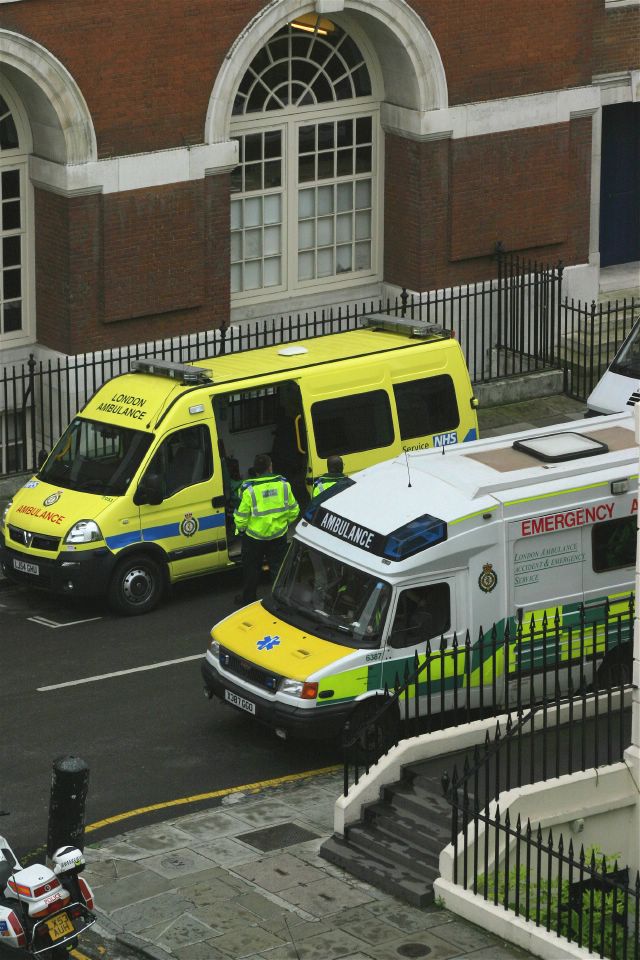 p showed curved around to within a block of the bomb site. One end, nearest the bus, was cordoned off, but the other wasn't, and at that end was a small hotel. I walked in. The desk clerk said, be with you in just one minute, sir, and walked into another room. I ran up six flights of stairs, found a ladder up to the roof and then went from one rooftop to another toward the far end of the crescent.
p showed curved around to within a block of the bomb site. One end, nearest the bus, was cordoned off, but the other wasn't, and at that end was a small hotel. I walked in. The desk clerk said, be with you in just one minute, sir, and walked into another room. I ran up six flights of stairs, found a ladder up to the roof and then went from one rooftop to another toward the far end of the crescent.
But that didn't work, either. The buildings immediately around Upper Woburn Place were higher than the rooftop I was standing on, blocking my view. All I could see were more ambulances waiting to find out if they were needed.
Finally, I gave up and climbed down some of the scaffolding around a building under repair, because I was fairly sure I shouldn't go back to that hotel. I ended up on the back porch of a house, the rear garden of which was surrounded by a high wall. I couldn't get out and I sure as hell didn't want to climb back up the scaffolding and go back the way I'd come. So I knocked on the back door.
A construction worker opened the door and stared at me, thoroughly confused. I smiled at him and walked inside and through the house and out the front door and back inside in a hurry, because two cops were walking by. The construction worker was from somewhere in eastern Europe, and he seemed to grasp the situation then; he was old enough to remember some really efficient secret police.
``Police-ski. Here they are a problem, too?'' he said.
``Right now they are,'' I told him.
He nodded and looked out and up and down the block.
``Okay now,'' he said.
I looked and couldn't see the cops, so I nodded, too, and went outside and started down the block, thinking myself very crafty, and turned a corner and ran into a woman cop. She was black and very pretty and very small, about five feet nothing in her combat boots, and she smiled at me with that police smile which means, roughly, Are we going to be polite here, or am I going to start breaking your bones?
``And where do you think you're going?'' she said.
``I'm trying to get home,'' I said.
``Home,'' she said. It wasn't a question; her tone implied she had her doubts, possibly because I had two cameras around my neck, their straps entangled with my press pass, and a camera bag slung on my shoulder and a light meter sticking out of my shirt pocket.
``I live over on the other side of the square,'' I said, and got out my wallet and showed her my driver's license, which has my address on it.
``Uh huh,'' she said, and might as well have added, White boy, that is the dumbest damn line I've heard today. ``Okay, come with me.''
She led me down the block and put me outside the police line and said, ``Go that way until you can turn right, then keep going. And,'' she added sweetly, ``with that camera hanging around your neck, you ain't getting through the line, so forget about trying.''
I thanked her and walked off with as much dignity as I could muster, which wasn't a hell of a lot. I kept walking and circling back toward the square and running into more cops standing in front 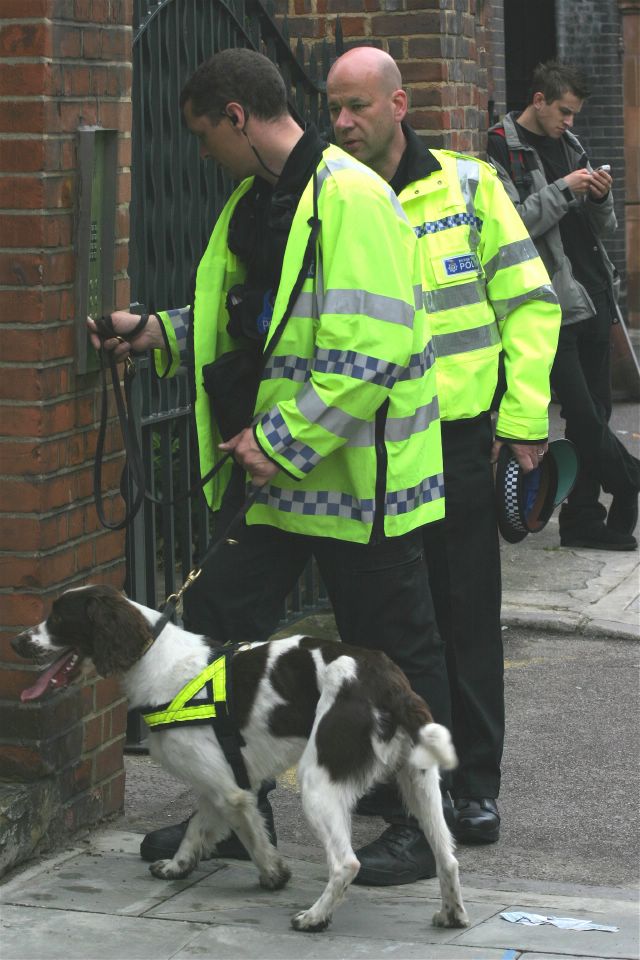 of crime-scene tape.
of crime-scene tape.
It was toward the south end of Russell Square that I met quite possibly the biggest idiot in London. He was a fat, sweaty man whose car was parked on Russell Square, and he saw no reason he couldn't just nip under the crime-scene tape and retrieve it.
The policeman maintaining the cordon was one of the polite ones. He explained the area was blocked off because it was a crime scene that had to be searched for evidence and also for what he blandly referred to as ``secondary devices,'' or bombs planted to kill the police and rescue workers rushing to the scene of an earlier bombing. I'd run into some of the bomb-sniffing dogs earlier.
The fat man said in a petulant whine that nobody seemed to be searching now and he couldn't hear any bombs going off, so why couldn't he pop over to his car. The policeman repeated the area was being searched for evidence and secondary devices and pointed out that a secondary device might not be going off now, but it was rather in the nature of bombs that they went off quite unexpectedly, and the fat man said, yes, but nobody's searching here now, and nothing's exploding, and the argument went on that way for a while, in a small, pointless circle, until the policeman simply turned his back and walked away. The fat mad sat down on a step nearby and muttered to himself for some time about the unfairness of it all.
The policeman had walked up near me, and I shook my head and smiled. He smiled slightly and shook his head. Despite our rapport, he wouldn't let me through, either. I headed off again, and presently I ran into another photographer, a Japanese guy with limited English who worked for a Tokyo newspaper, if I understood him correctly, which I probably didn't. We both spoke photo, though, so we compared notes and realized between us we'd covered a lot of territory and, in his words, we no got shit.
Since we'd been heading south, we started walking north, and there we ran into a couple of British photographers, who also had no got shit. But they thought there was a point 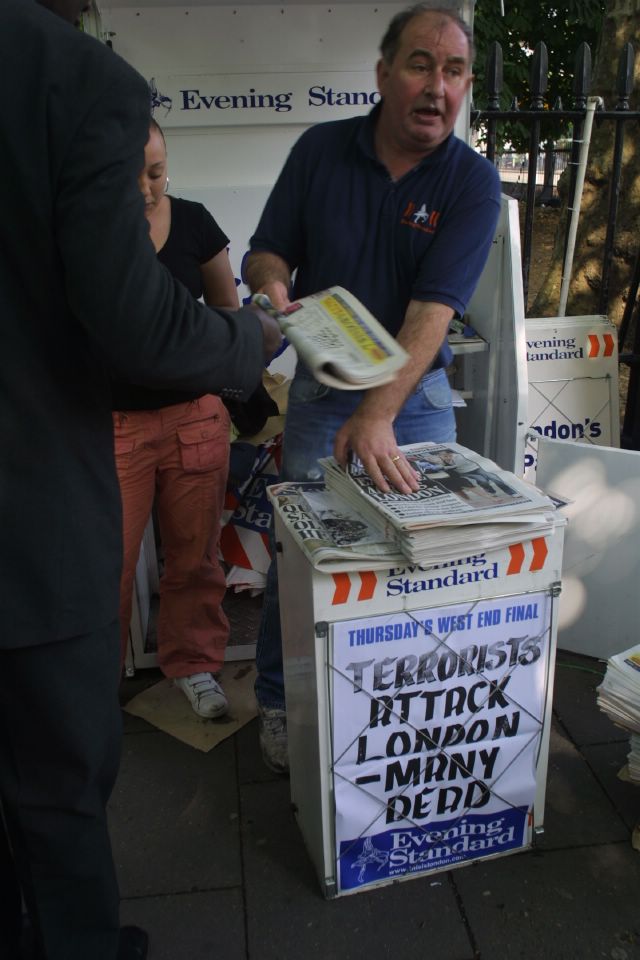 north of the square where you could get a glimpse of the bus, and that was what I wanted -- by that point, very badly wanted.
north of the square where you could get a glimpse of the bus, and that was what I wanted -- by that point, very badly wanted.
More photographers fell in with us as we walked, including one college kid who owned a couple of cameras and got caught up in our collective sense of desperation, because we had no got shit and needed to get some pretty fast. The kid turned out to be impressively inventive; with his college ID and a lot of lying about how we were all his friends and guests, just going up to his room, won't be a moment, he got us into some buildings belonging to the University of London, an institution scattered throughout the Russell Square area. None of these particular buildings had a roof high enough to give us a view, though.
We kept walking north until we got to Euston Square, a Tube stop north of Russell Square. The Tube was shut down, of course, but the square was still full of people who needed to get home and were hoping to find a train running somewhere. At one corner was a news agent selling evening papers as fast as he could hand them over and collect his forty pence.
We cut a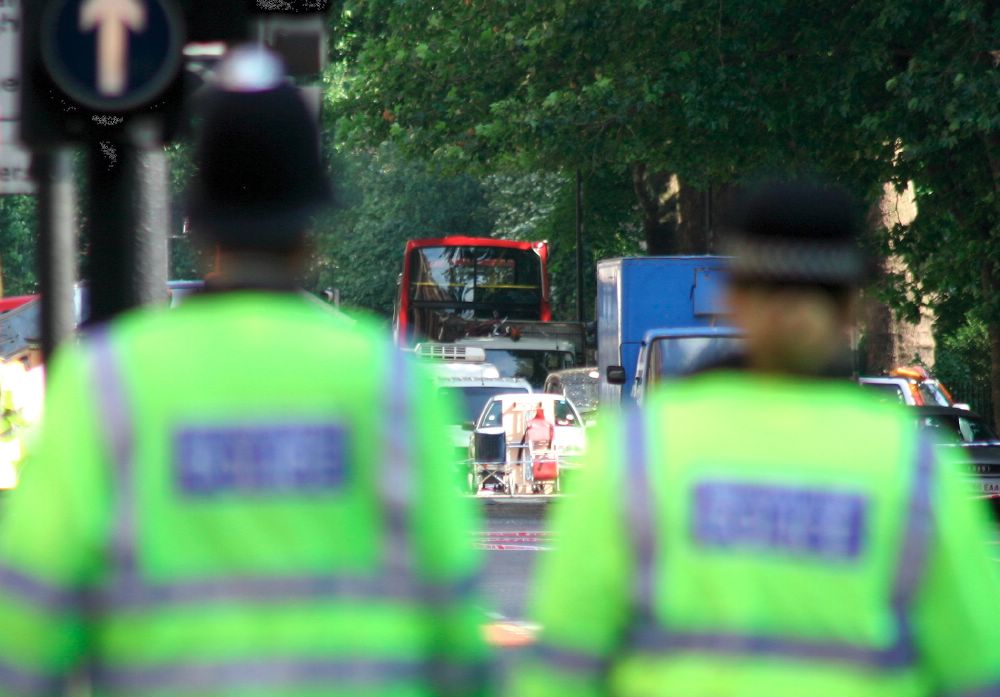 cross the lawn in front of Euston Square and finally, thank God or whoever looks after chain-smoking, foul-mouthed, tired, sweaty, red-faced packs of photographers -- by then there were about twenty of us, British, American, Japanese, German, and French -- we found the bus. It was way the hell down the road, obscured by trees and emergency vehicles, but it was clearly the bus. The roof was missing and the sides were charred and it was surrounded by crime-scene personnel, bomb-squad technicians, rescue workers, miscellaneous police, and Lord knows who else.
cross the lawn in front of Euston Square and finally, thank God or whoever looks after chain-smoking, foul-mouthed, tired, sweaty, red-faced packs of photographers -- by then there were about twenty of us, British, American, Japanese, German, and French -- we found the bus. It was way the hell down the road, obscured by trees and emergency vehicles, but it was clearly the bus. The roof was missing and the sides were charred and it was surrounded by crime-scene personnel, bomb-squad technicians, rescue workers, miscellaneous police, and Lord knows who else.
Our pack joined the photographers already there -- obviously, the more intelligent and experienced members of the profession. We all pawed through our bags for our longest telephoto lenses and got ourselves into position and snapped away. The clicking shutters and whirring motor drives sounded as if a herd of crickets had settled in the square and then gone insane.
None of us got any pictures that were very good, as photographs. They had some value, I suppose, as documents recording the event. I snapped away from every angle I could find -- none made much difference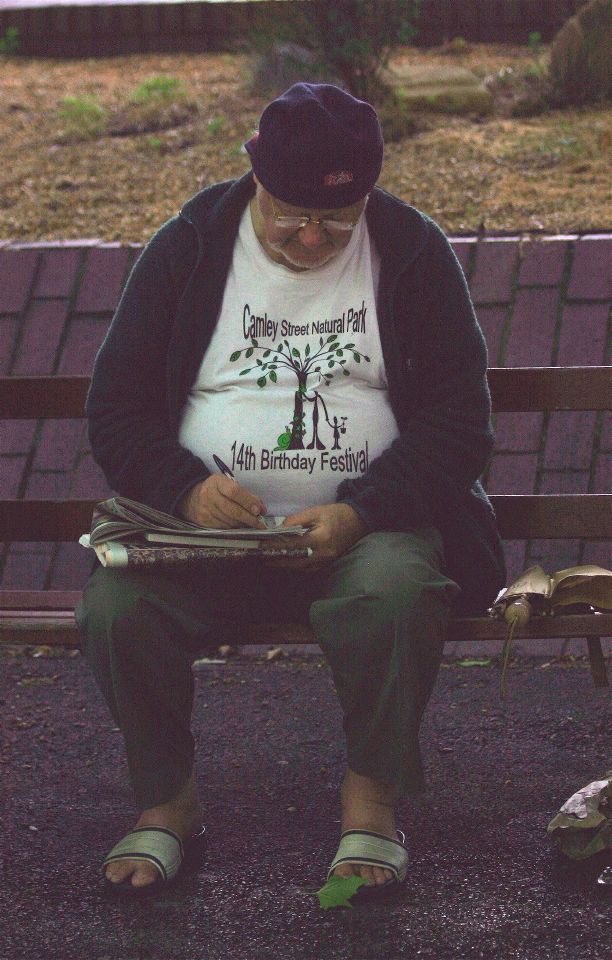 -- and then I started back across Euston Square. I was exhausted; I'd walked miles with my camera bag and cameras hung on my neck and shoulders; I'd climbed onto rooftops and across them and down off them and walked some more, and I was about a mile from my flat and still had to get there and send the photos back to the office. But as I was cutting around behind Euston Square, I took one more picture: one of those English eccentrics who can ignore everyone and everything that's going on around them and devote themselves to one odd pursuit -- bird-watching, brass-rubbing, or, in this case, crossword puzzles.
-- and then I started back across Euston Square. I was exhausted; I'd walked miles with my camera bag and cameras hung on my neck and shoulders; I'd climbed onto rooftops and across them and down off them and walked some more, and I was about a mile from my flat and still had to get there and send the photos back to the office. But as I was cutting around behind Euston Square, I took one more picture: one of those English eccentrics who can ignore everyone and everything that's going on around them and devote themselves to one odd pursuit -- bird-watching, brass-rubbing, or, in this case, crossword puzzles.
I got back to the flat, downloaded my photos, and culled through them for the ones I thought might be usable. I called the photo editor and told him I'd got a bit of his bus for him. It wasn't much, I said, but it was definitely, undeniably, the bus that had got blown up. He was ecstatic, for an Englishman.
``Well done,'' he whispered. ``Thanks awfully for sticking with it.''
After I'd transmitted my stuff, I attached my flashgun to my best camera and went back to the south end of Russell Square and waited for a couple of hours, hoping I could get a shot when they towed the bus away. I waited until it got dark, then for a while longer, until a truck pulled up and went through the police cordon carrying a load of floodlights on top of long poles. I knew then the bomb technicians and the crime scene people were expecting to be there for quite a while yet.
I went home and collapsed into bed. I crashed not just physically but emotionally. My entire focus most of the day had been on finding the bus and taking pictures of it. If I did that, I succeeded; if I didn't, I failed. It had no other meaning for me. But once I'd done that and crawled into bed, I could think of it in other terms. People got killed on that bus -- thirteen people, they say now. All told, more than fifty people are confirmed dead so far. That will increase; they haven't got all the bodies out of the tunnel between King's Cross and Russell Square, which is one of the deepest in London.
It could have been a lot worse, of course. The bombings in Madrid killed 191. September 11 killed 3,000. In a sense, we were lucky. I don't think anyone in London feels particularly lucky, though.
None of the bodies has been identified. That haunts me. The friends and families of more than fifty people haven't heard from them in more than two days. Many of them will know what Tube line the missing people usually take to work and about what time they take it. They must suspect the worst, but they don't know.
I try to imagine what that would be like for my mother, now 82
and
living alone in Richmond, Virginia. I imagine her calling my office and my flat and e-mailing me, and calling my brother in Florida and my friends in New York 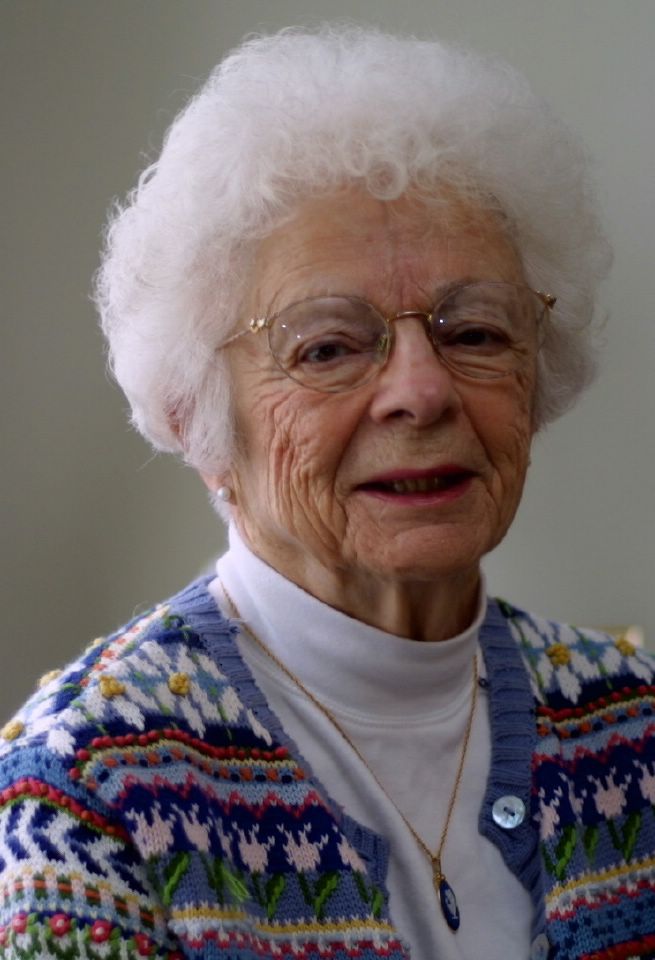 and Washington
, hoping against hope somebody will say he's heard from me, I'm fine, it's just with everything going on, he's incredibly busy, knowing without wanting to admit it that's not going to happen. Then I try to imagine I'm the one waiting.
and Washington
, hoping against hope somebody will say he's heard from me, I'm fine, it's just with everything going on, he's incredibly busy, knowing without wanting to admit it that's not going to happen. Then I try to imagine I'm the one waiting.
I can't imagine it, really. Until you've been in that situation, I doubt you can. But how many people do you suppose an average person is close to? Close enough that they care very much what happens to him? Ten, fifty, a hundred? Whatever it is, multiply that by however many people were killed Thursday, and you begin to get some idea of just how awful a day it was.
Incidentally, so far as I know, none of my friends or colleagues here were on any of the trains or the bus. I have the same thought now I had after 9-11, though. How many friends of friends, casual acquaintances, people I'd met here and there and don't especially remember, might have been one of those sitting on the wrong train deep underground or trundling along on a grey, dreary London morning, glad he'd run and caught that particular bus, because God knows when the next one would come along, the transit system is so awful these days, can't depend on it at all . . .
Maybe nobody I knew at all was on any of the trains or the bus. I hope not, and at the same time, it seems wrong to hope not. Everybody who got killed was close to somebody. None of them deserved to die. Nobody had anything remotely like a reason to kill them.
At least one Londoner thought he knew of some reasons, though. He is George Galloway, a member of Parliament. I quote from the BBC (the ellipses indicate commentary by the BBC reporter I've omitted):
Within hours of Thursday's bombing atrocity Respect MP George Galloway was on his feet in the House of Commons saying Londoners had paid the price for Tony Blair's policy in Iraq and Afghanistan.
His comments were branded "disgraceful" by Armed Forces Minister Adam Ingram.
But at a Stop the War Coalition press conference Mr Galloway was having none of it, insisting the families of the dead and injured would not be offended by his words . . .
"Silence would be complicity. I am not prepared to be complicit when people in Iraq and London are paying a blood price for Blair's bizarre special relationship with Bush," he said.
In the Commons Mr Galloway was heckled as he spoke. But at the Socialist Workers Party Marxism 2005 conference on Friday, just around the corner from the scene of the Bloomsbury bus bomb, he received a rapturous welcome.
Clearly for many on the left the MP's stock could not be higher and telling a room full of comrades that Tony Blair's administration is a "rotten government with a rotten foreign policy" was a genuine crowd pleaser.
He said although the primary responsibility for Thursday's attack on London lay with the terrorists, UK involvement in Iraq played its part.
Mr Galloway . . . later said Mr Blair should quit and the UK should "cease its obscene special relationship with the worst US president ever".
"We must get out of that axis of evil," the Bethnal Green and Bow MP said.
"I don't believe Mr Blair or Mr Bush are capable of solving this problem - I believe they are the cause of this problem," he said.
He said Britain would be a safer place if it had a change of foreign policy.
"We will threaten the safety of our citizens and our interests unless we change political course," he warned before stressing he did not think the West should talk to Osama Bin Laden.
I cannot begin to express my contempt for the Right Honorable Mr Galloway, and with all due modesty, I think I usually express myself quite well. His remarks probably shouldn't be dignified by any response I can make, although in an earlier and in some ways more sensible age, tar and feathers might have been considered right and proper.
But let's think a little about what he said. After boiling away the noxious rhetoric, it amounts to this: it's perfectly understandable that a group of people should maim and kill a random selection of other people who happen to live in or be passing though a country with whose government that group is at odds.
Keep in mind the random selection of victims will include people who have no real connection to that country. The wounded in London so far are known to include people from Australia, China, Poland, Portugal, and Sierra Leone. They had nothing to do with the policies of the British government and no influence over those policies.
Keep in mind also that the victims will include those who disagreed with that government, in many cases vehemently. In the London bombings, I dare say most of them did. Edgware Road is the center of the Arabic-Islamic community in London. The chances are anyone catching the Tube there is from the Middle East. Russell Square lies within Bloomsbury and, as I said, it's surrounded by the University of London. The area is rife with anti-war, anti-western sentiment -- I refuse to call it ``thinking.'' And Aldgate East serves the heavily Muslim district that elected Mr Galloway to Parliament. He represents its residents in the House of Commons. We can safely assume some of the people using the Tube station there on Thursday morning agreed with his general point of view and voted for him. Mr Galloway, in effect, was saying he understood why some of his constituents needed to be murdered on their way to work.
Maybe he did understand it. I'll stipulate Mr Galloway may have a finer intellect than I. His thinking may be subtler and his breadth of understanding greater than mine. I would like to ask him a question, though. If Afghanistan and Iraq led to the bombings in London, what led 19 Islamic murderers to crash airliners into the World Trade Center and the Pentagon? Afghanistan and Iraq weren't the cause of September 11. They were and are its effect. Afghanistan and Iraq didn't lead to that attack. They are the retaliation for it.
But my understanding may be limited. I'm from New York. I spent September 11 making phone calls and sending e-mails to find out if anyone I knew had been killed. Now I live in London, and I spent July 7 surrounded by wailing sirens, walking among a lot of stunned, silent people, and looking at the remnants of a Number 30 bus that was chosen, at random, as the place where thirteen people should be blown to shreds.
So I have an admittedly emotional, conceivably simplistic, and certainly brutal understanding of the situation. I want to make it as clear as I can.
We're at war. We've been at war since September 11, 2001. We're at war with those members of the Islamic faith who want to blow up office buildings, Tube trains, and double-decker buses. They are also the members of the Islamic faith who feel -- again, I refuse to use the word ``think'' -- that a writer like Salman Rushdie who expresses some lack of respect for the Koran, a screed inspired by the ravings of a seventh-century religious fanatic, should be murdered, and who offer a reward for his death. They feel a woman who exposes her face in public should have acid thrown in it. They feel barbers who cut men's hair in a fashion different from that preferred by those of the true faith should be shot and killed. They feel a woman whose brother might have engaged in a love affair they disapprove of should be gang-raped and then paraded naked through her village. They feel women who have sex outside marriage should be beheaded and gays should be crushed to death with stones. They feel, in short, western civilization is evil. They want to kill us, and it's not for anything in Afghanistan or Iraq that we've done. They want to kill us for what we are.
They want to kill us. I want us to hunt them down and kill them first.
When I went back to Russell Square Thursday evening, I ran into another photographer, an American my age named Tom who lives in Paris and works for one of the photo agencies there. The Eurostar had quit running after the attacks and he'd had trouble getting a flight and had just arrived. I filled him in on what was happening and told him I was waiting where I was because it seemed the logical route along which they'd tow the bus when they moved it. I showed him on my street map and he agreed and waited with me for a while.
He was an interesting, friendly guy who'd lived in Paris since 1973. He told me he'd been worried ever since September 11 something would happen there. Now he was sure Paris would be next.
I thought about it, then I said, no, I think Rome is a better bet. France hasn't been allied with the United States in Iraq, but Italy has been, I said. Italian security is probably worse than French security and it's just across the Mediterranean from the Mideast.
And it's virtually all coastline that's impossible to patrol adequately, Tom said. Yeah, you're probably right. Rome's more likely to be next than Paris.
The conversation meandered on from there, just two middle-aged guys with the same slightly ghoulish occupation passing the time until they had some work to do . Tom eventually said he had to go take a picture somewhere of something. We said our goodbyes and not long afterwards, I walked home myself.
It was a little past 10 p.m. The streets were mostly empty and darker than usual because fewer pubs and restaurants were open. In those that were, the people eating their late dinners or standing with their pints of beer looked disturbingly vulnerable in the light through the plate-glass windows.
Police cars and ambulances kept tearing past with their sirens howling. The p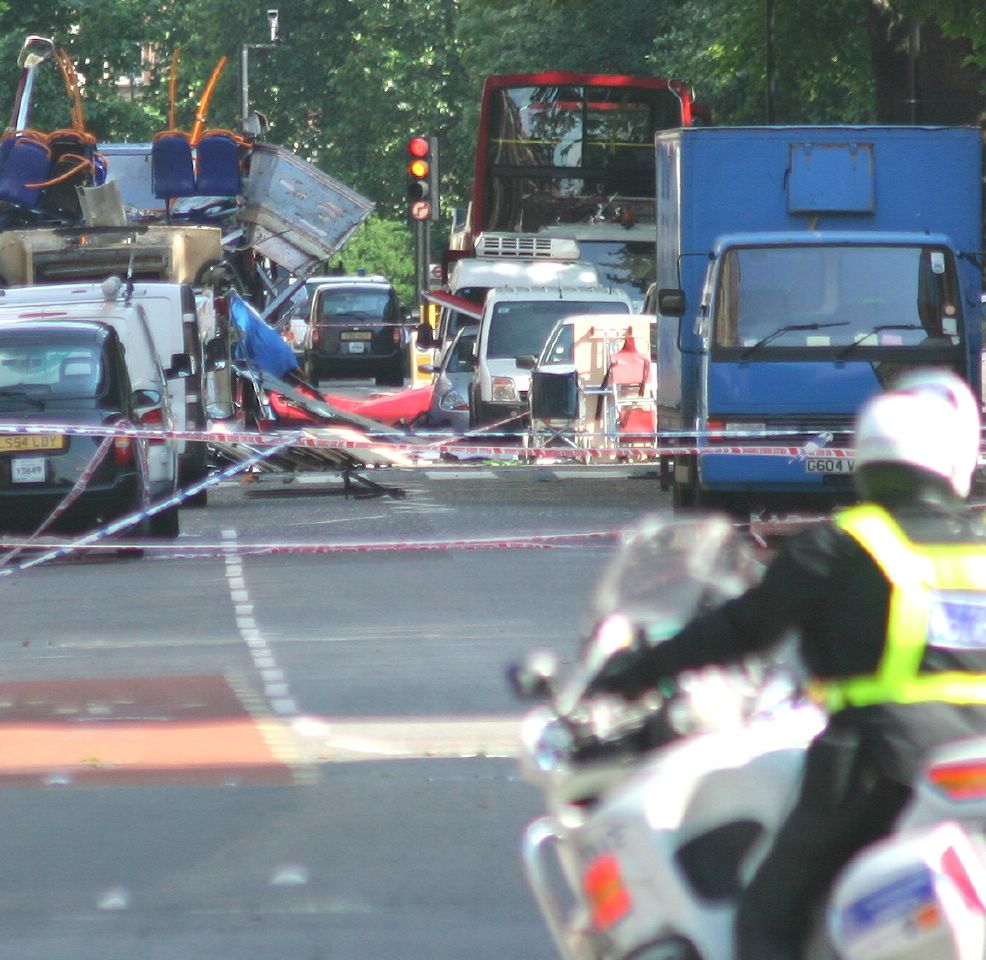 avements were patrolled by an army of police on foot, walking with purpose but going nowhere in particular. Occasionally, one of the police officers would stop to give directions to a civilian who hadn't found a way home or to help a bewildered tourist who couldn't get to his hotel because the hotel was behind the police cordon.
avements were patrolled by an army of police on foot, walking with purpose but going nowhere in particular. Occasionally, one of the police officers would stop to give directions to a civilian who hadn't found a way home or to help a bewildered tourist who couldn't get to his hotel because the hotel was behind the police cordon.
My own street, a narrow Dickensian alley one block long, was dark and deserted and when I turned into it, I felt my first, absolutely irrational thrill of anxiety and paranoia. It passed quickly, once I got inside. It wasn't until I started putting my camera gear away that something about the conversation with Tom occurred to me.
We had both assumed someplace would be next.
Larry